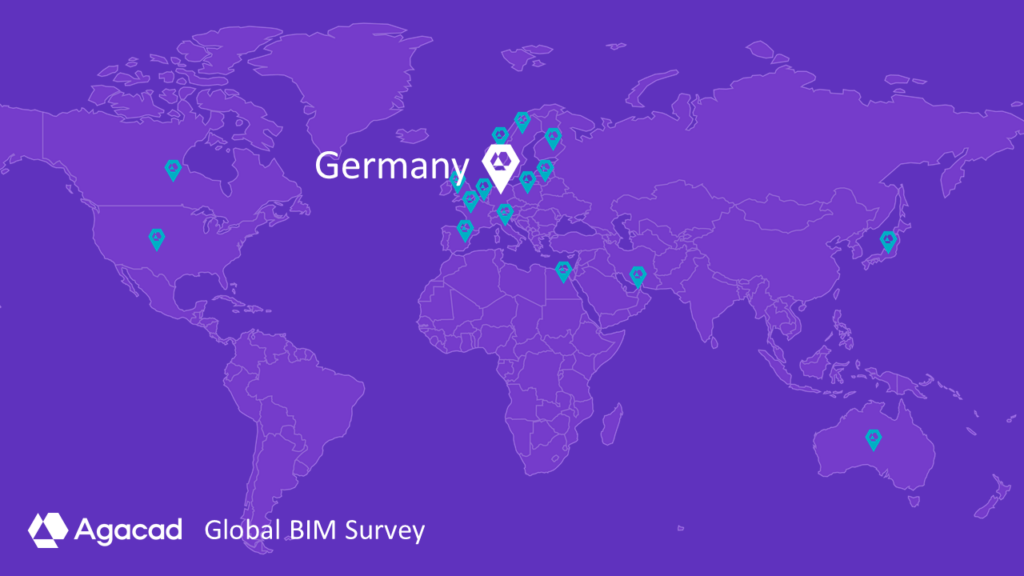Drawing on the insights of our partners around the world, Agacad is examining the status and specifics of BIM use in different countries.

This time we look at Germany together with two specialists at Contelos GmbH, a CAD solution provider and Autodesk dealer based near Hannover that has been working with clients of all sizes and industries all over the major European country since 1992.
Serious preparations to digitise the construction industry
In the digital transformation of manufacturing, Germany – the home of Industrie 4.0 – has an early lead. But in digitalizing architecture, engineering and construction, the country is taking more time.
Neither the state nor the private sector has rushed to make building information modelling (BIM) the new normal, note Insa Rasche, an AEC Application Engineer at Contelos, and Olav Sosath, Deputy Area Manager at the German IT solutions and advisory firm.
“It is coming, but slowly,” says Rasche, who is an architect and BIM consultant.
The reasons are varied: a desire for thorough analysis and preparations together with stakeholders to make sure that BIM is done well; bureaucracy and some disagreements among authorities about what to do and when; and classic resistance to change among ordinary practitioners.

In 2015, the German Federal Ministry of Transport and Digital Infrastructure defined a comprehensive roadmap for the gradual introduction of BIM methods. The large government project included the preparation of well-defined use cases for BIM implementation, conducting a number of carefully planned pilot projects, and developing detailed guidelines and policy positions.
Those efforts led, step by step, to the introduction in December 2020 of a BIM mandate for federal infrastructure projects. The next major step forward, likely in the form of unified national standards for BIM and classification along with a more extensive state mandate, is expected in 2025.
“Today we have some guidelines prepared by industry associations, and bigger companies define standards for themselves. But without a common standard, everyone can do what they want. And among smaller companies, BIM is not really used yet, unfortunately,” Rasche explains.
Emerging criteria for working with digital data
Stakeholders are actively engaged in the development of a German BIM standard.
“Companies and industries are working, and international organisations like buildingSMART are helping, to bring good practices, prepare guidelines, make suggestions,” Contelos’s Olav Sosath notes.

Perhaps most visible are Bau Industrie, the construction industry association, with its technical position papers, and VDI, the Association of German Engineers, with its standards proposals. The organisation’s Building Information Modeling Manual includes VDI documents (currently 26) on BIM practices. Among them, for example, are VDI 2552 Blatt 1 of July 2020 with 56 pages on general aspects of the creation and use of building information, and VDI 2552 Blatt 10 of February 2021 with 16 pages on Employers Information Requirements (EIRs) and BIM Execution Plans (BEPs).
The government’s current mandate for BIM use offers a reference process for creating, managing and sharing digital data. It also includes “performance level 1” minimum criteria, like specification of clients’ data and information requirements as part of procurement and preparation of a BIM Execution Plan outlining how the requirements will be met. BEPs are to include project-specific BIM objectives and the relevant BIM use cases. Data-exchange formats should be vendor neutral.
Education needs for AEC professionals

Contelos observes gradually increasing BIM use on the German market, at least among larger companies, even apart from government infrastructure projects where it is now required. Growth is being driven mainly by clients requesting BIM methods, especially for the sake of 3D visualisation.
“The companies that come to us are interested but often kind of scared. They see that BIM is coming and they need it or else they won’t be modern and competitive anymore,” Insa Rasche notes.
“Smaller companies are lagging behind,” she stresses. “They don’t know how to start. They say: ‘We’ve been working like this for 30 years and it works, why change?’ They know they will have to invest in BIM technologies and skills sooner or later, but the value often isn’t clear to them yet.”
Both Rasche and Sosath are convinced that education is now key for promoting BIM use in the country. In selling BIM solutions and training clients to use them, Contelos and its competitors are helping to boost understanding in the AEC industry of the value of digitalisation. But much more is needed at the level of study and training programmes for AEC professionals in Germany.
“The younger generation really wants to change something, but from my own experience, most universities in Germany are not there yet in terms of teaching BIM to architects and engineers. There is room to do much more here, and that will then help bring change to companies,” Rasche says.

That concludes our look at BIM today in Germany. Follow the Agacad blog for regular insights on BIM practices in different countries.
More Global BIM Survey reports are coming soon – stay tuned!
Prepared by Bryan Bradley of Textus Aptus







